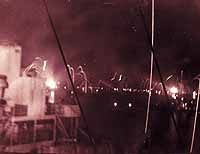| Ships launch missles and shoot off guns in a harbor on the island of Samar the night that it was announced that the Japanese had surrendered. That announcement ended World War II. |
Kobe. “One guy was really good at the game and there was a lot of money bet. He had literally thousands of dollars he had won. Not trusting anyone he buried the money in coffee cans in the ground some distance from the camp. One day the Japanese made a bombing raid, missed the base and instead hit his stash. He dug for days trying to find those coffee cans. He never found most of the money.”
When the surrender of the Japanese came Kobe was soon on his way home. He landed in Seattle, Wash. and then went to St. Louis, Mo. Soon he was in Kansas City.
There he took a job with the YMCA but soon he wanted to return to college. A chief petty officer he knew in the Navy told him about Utah State University and a professor there he knew. Kobe conversed with the professor by mail and soon he and his wife were on their way to Logan.
“We rode the train to Ogden then took a bus to Logan,” he said. “When we got there they told us they had no housing for us, but we were able to stay with family for a few days. Then the professor I had worked with to get to Utah State said he had an extra room in a house he was renting out. And was it some room.”
| Jack Kobe stands behind a bunch of his buddies in front of their tent on the island of Samar in the Philippine Islands in 1944. |
Kobe says it was an upstairs attic room and it was a mess. He and Betty cleaned for a whole day, but eventually made it into a home.
“In fact I think we had the most comfortable bed I have ever slept in in that room,” said Kobe.
He eventually got his bachelors degree from Utah State, and was immediately hired by a superintendent of the Inkom, Idaho schools to be a teacher and a coach.
“I lacked a couple of classes to be completely qualified, but there was a teacher shortage and they let me work around it by taking those classes during my first year as correspondence courses,” said Kobe.
Kobe taught in Inkom until 1950 and then went to work at Pocatello High School. He had produced some very successful teams at the small Inkom High and he went on to start a tradition at Pocatello too, but after a year he decided he wanted to go back to school and get a masters degree.
Once he was done with his masters, he was offered a job at Green River High School in Emery County. He taught and coached there from 1951 until 1954, at which time he then came to Carbon County to where he taught at Notre Dame School for a few years.
“They were about to go from being a elementary-junior high school to a high school and they needed a coach so I said yes,” he stated.
| Jack Kobe stands in front of his plaques which include induction into the CEU Hall of Fame and the Utah State Athletic Hall of Fame. |
In 1959 he went to teach at Wellington Junior High and then in 1967 he became a teacher and coach at Carbon High School.
“I had coached a lot of things in my life but I have always liked swimming,” he said. “That was my chance to start coaching a swimming team so we began the swimming program at Carbon.”
After 37 years of teaching, Kobe retired from Carbon School District in 1983.
| Jack Kobe in his teaching days. |
Kobe also talked about many of the coaches and sports writers he has known over the years. He brought up names like John Mooney (late former sports editor for the Salt Lake Tribune, Marion Dunn, (a sports writer for the same paper and later sports editor for the Provo Daily Herald) and Dick Rosetta, former sports writer, also from the Tribune.
“I used to go up to Tribune and talk to those guys all the time,” he said. “There were some real good people there.”
Presently Kobe enjoys life in his house in west Price and is active in the Veterans of Foreign Wars as well as the American Legion.
“Every once in a while I will hear from a former student or athlete I worked with,” he said. “It’s a good feeling when they call or come to see me and tell me how good their lives have been. Some even tell me that I was a big factor in that success. There is nothing better than that.”

